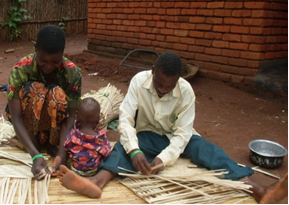
It is rare to find a woman in Malawi weaving baskets, a task considered only for men. Esmy Malufela, who lives in Njoloma village in the Chikumbu Traditional Authority of Mulanje district, is one of those rare women.
Malufela has four children with her husand Duncan. She has been weaving baskets for a number of years without most of her community’s knowledge. She picked up weaving by watching her father and enjoyed the peaceful craft. The few villagers who saw her weaving ridiculed her for performing the work of men. Even her husband was not supportive.
The money that Malufela realized from sales of the few baskets that she wove in hiding was not enough to provide even the basic needs of food, clothing, shelter and health care for her young family. Her husband’s income from farming was also insufficient, so the Malufelas and their children suffered every year during Malawi’s hunger season, from August to March, when maize reserves run out.
Then Malufela attended training in late 2012 on the African Transformation toolkit, a behavior change tool that promotes gender equity, participatory development, and community action. The toolkit, created by USAID implementing partner Johns Hopkins University, envisions a tolerant society where men and women mutually respect each other, are able to critically examine gender norms and inequities, and participate in equitable decision making and resource allocation.
"I used to be afraid of what people might say or think about me when they see me weaving the baskets, but after the African Transformation training, all fears vanished,” said Malufela.
Both women and men who attended the training, including Malufela's husband, clearly grasped that both genders can carry out roles that have been culturally restricted to just one sex. In addition, the community is learning that the economic empowerment of women empowers an entire family.
Funded by the U.S. President’s Emergency Plan for AIDS Relief through USAID, the toolkit helps individuals, families and communities explore and challenge gender norms and social roles, reinforce those that have a positive impact, and change those that affect them negatively. The programs and approaches help show entire communities that gender norms do not have to remain static, but can change to the benefit of all.
Malufela is happy that the training also inspired her husband to help her weave the baskets. “Together we weave more baskets than she could weave alone," says Duncan. "My wife has also inspired other women to venture into the basket weaving business.”
Their new combined efforts have yielded many more baskets and increased profits. As a result, the Malufelas built a brick house, bought a bicycle, and can support their children in school.







Comment
Make a general inquiry or suggest an improvement.